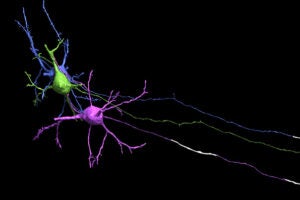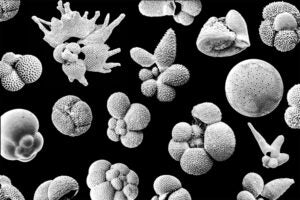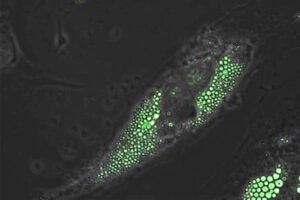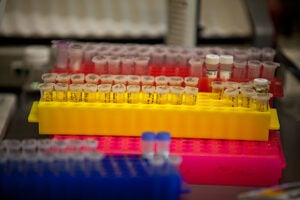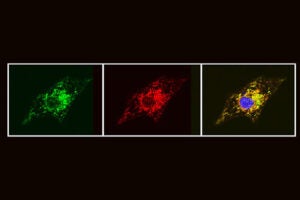Tag: Harvard Stem Cell Institute
-
Nation & World
Potential diabetes treatment advances
Researchers at MIT’s David H. Koch Institute for Integrative Cancer Research, in collaboration with scientists at the Harvard Stem Cell Institute and several other institutions, have developed an implantable device that in mice shielded insulin-producing beta cells from immune system attack for six months — a substantial proportion of life span.
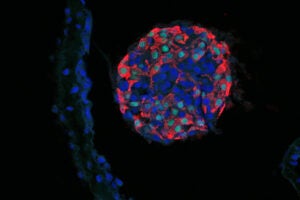
-
Nation & World
Researchers help cells forget who they are
Scientists identify a molecular key that helps cells maintain identity and prevents the conversion of adult cells into induced pluripotent stem cells — a process that would require a cell to “forget” its identity before assuming a new one.
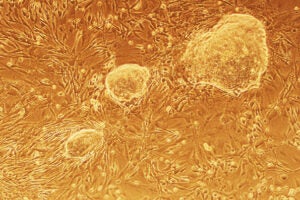
-
Nation & World
Neurons reprogrammed in animals
Harvard Stem Cell Institute researchers have shown that the networks of communication among reprogrammed neurons and their neighbors in the brains of living animals can also be changed, or “rewired.”
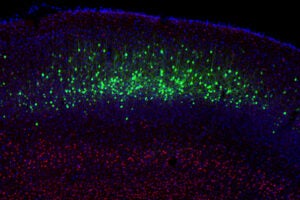
-
Nation & World
Converting skin cells to stem cells creates ‘kidney structures’
Researchers create complex kidney structures from human stem cells derived from the skin of adult patients.
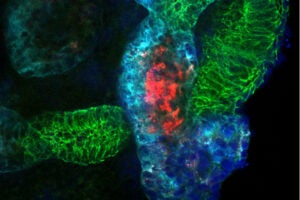
-
Nation & World
Potential treatment for muscular dystrophy
Harvard researchers report that by identifying and mimicking important developmental cues, they have been able to drive cells to grow into muscle fibers capable of contracting in a dish and multiplying in large numbers. This new method of producing muscle cells could offer a better model for studying muscle diseases, such as muscular dystrophy, and…
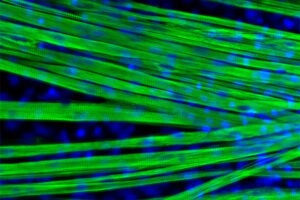
-
Nation & World
New hope in old viruses
Harvard Stem Cell Institute researchers at Massachusetts Eye and Ear have reconstructed an ancient virus that is highly effective at delivering gene therapies to the liver, muscle, and retina.
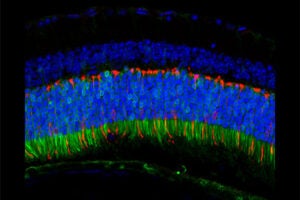
-
Nation & World
Zebrafish reveal drugs that may improve bone marrow transplant
Using large-scale zebrafish drug-screening models, Harvard Stem Cell Institute researchers at Boston Children’s Hospital have identified a potent group of chemicals that helps bone marrow transplants engraft, or “take.”
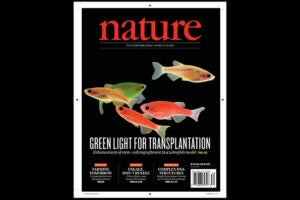
-
Nation & World
Promising stem cell therapy
Harvard Stem Cell Institute researchers at Massachusetts General Hospital have developed an “imageable” mouse model of brain-metastatic breast cancer and shown the potential of a stem-cell-based therapy to eliminate metastatic cells from the brain and prolong survival. The study, published online in the journal Brain, also describes a strategy for preventing the potential negative consequences…
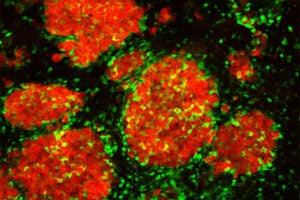
-
Nation & World
Brains or skin?
A protein that is necessary for the formation of the vertebrate brain has been identified by researchers at the Harvard Stem Cell Institute (HSCI) and Boston Children’s Hospital, in collaboration with scientists from Oxford and Rio de Janeiro.
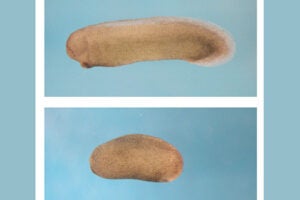
-
Nation & World
Possible progress against Parkinson’s
Harvard Stem Cell Institute researchers at McLean Hospital have taken what they describe as an important step toward using the implantation of stem cell-generated neurons as a treatment for Parkinson’s disease.
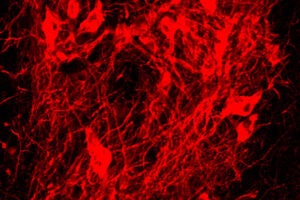
-
Nation & World
A new stem cell advance
Collaborating with scientists elsewhere, Harvard Stem Cell Institute researchers have devised two methods for using stem cells to generate the type of neurons that help regulate behavioral and basic physiological functions in the human body, such as obesity and hypertension, sleep, mood, and some social disorders.

-
Nation & World
A pill to shed fat?
Harvard Stem Cell Institute researchers have taken what they describe as “the first step toward a pill that can replace the treadmill” for the control of obesity.
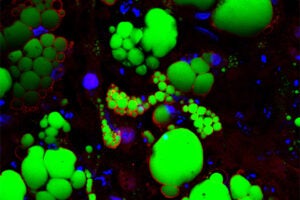
-
Nation & World
Precancerous state found in blood
Harvard researchers have uncovered an easily detectable, “premalignant” state in the blood that significantly increases the likelihood that an individual will go on to develop blood cancers such as leukemia, lymphoma, or myelodysplastic syndrome.
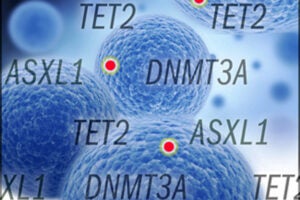
-
Nation & World
Creating pain-sensing neurons
Harvard Stem Cell Institute researchers at Boston Children’s Hospital and Harvard’s Department of Stem Cell and Regenerative Biology have successfully converted mouse and human skin cells into pain-sensing neurons that respond to a number of stimuli that cause acute and inflammatory distress.
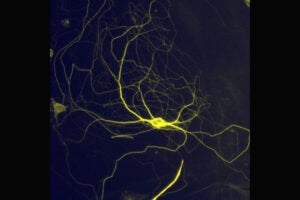
-
Nation & World
The cellular origin of fibrosis
Harvard Stem Cell Institute scientists at Brigham and Women’s Hospital have found the cellular origin of the tissue scarring caused by organ damage associated with diabetes, lung disease, high blood pressure, kidney disease, and other conditions.
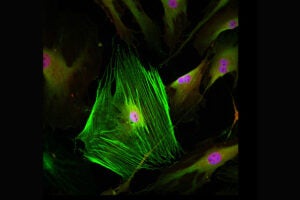
-
Nation & World
Reprogramming cells, long term
Harvard Stem Cell Institute researchers have demonstrated that adult cells, reprogrammed into another cell type in a living animal, can remain functional over a long period. The work is an important advance in the effort to develop cell-based therapies for tissue repair, and specifically in the effort to develop improved treatment for diabetes.
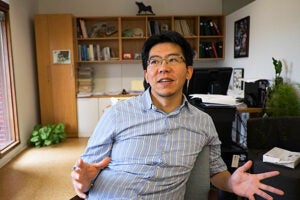
-
Nation & World
A promising strategy against HIV
Harvard Stem Cell Institute researchers at Massachusetts General and Boston Children’s hospitals for the first time have used a relatively new gene-editing technique to create what could prove to be an effective technique for blocking HIV from invading and destroying patients’ immune systems.

-
Nation & World
Giant leap against diabetes
Harvard stem cell researchers announced a giant leap forward in the quest to find a truly effective treatment for type 1 diabetes, a disease that affects an estimated 3 million Americans.
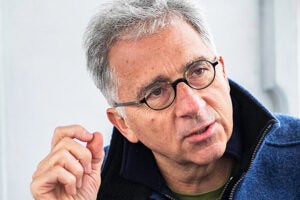
-
Nation & World
Progress against ALS
Studies begun by Harvard Stem Cell Institute scientists eight years ago have led to a report that may be a major step in developing treatments for amyotrophic lateral sclerosis, or Lou Gehrig’s disease.
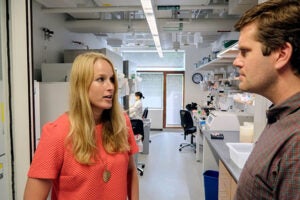
-
Nation & World
New way to regrow human corneas
Harvard-affiliated researchers have identified a way to enhance regrowth of human corneal tissue to restore vision, using a molecule that acts as a marker for hard-to-find limbal stem cells.
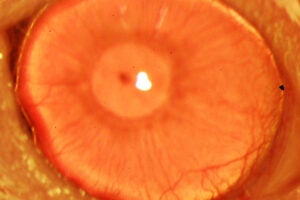
-
Nation & World
Improving stem cells’ regenerative potential
A team at Harvard Stem Cell Institute recently found that transplanting mesenchymal stem cells along with blood-vessel-forming cells naturally found in circulation improves results. This co-transplantation keeps the mesenchymal stem cells alive longer in mice after engraftment, up to a few weeks compared with hours without co-transplantation.
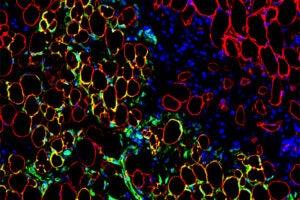
-
Nation & World
A shot against heart attacks?
Harvard Stem Cell Institute scientists collaborating with researchers at the University of Pennsylvania have developed a “genome-editing” approach for permanently reducing cholesterol levels in mice through a single injection, a development with the potential to reduce the risk of heart attacks in humans by 40 to 90 percent.

-
Nation & World
Bridging science and religion
Divinity School graduate Shelley Brown is combining her love for science and religion to help stitch together two fields that rarely seem to meet.

-
Nation & World
A decade of breakthroughs
The Harvard Stem Cell Institute is now 10 years old. What began as an idea embracing cross-disciplinary research quickly became a generator of scientific discoveries.
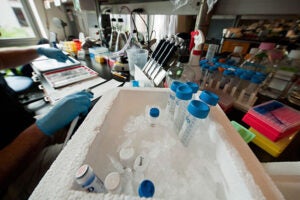
-
Nation & World
Hope for aging brains, skeletal muscle
Researchers at the Harvard Stem Cell Institute have shown that a protein, one they previously demonstrated can make failing hearts in aging mice appear more like those of young and healthy mice, similarly improves brain and skeletal muscle function in aging mice.
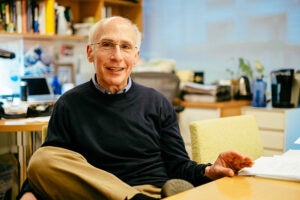
-
Nation & World
New hope in regenerative medicine
Harvard Stem Cell Institute researchers at Boston Children’s Hospital have reprogrammed mature blood cells from mice into blood-forming hematopoietic stem cells (HSCs), using a cocktail of eight genetic switches called transcription factors. The reprogrammed cells have the functional hallmarks of HSCs and are able to self-renew like those cells.

-
Nation & World
Turning science on its head
Myelin, the electrical insulating material in the body long known to be essential for the fast transmission of impulses along the axons of nerve cells, is not as ubiquitous as thought, according to new work led by Professor Paola Arlotta.
